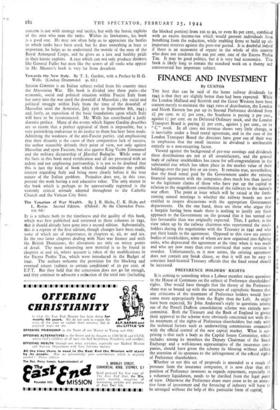FINANCE AND INVESTMENT
By CUSTOS THE best that can be said of the home railway dividends for 1943 is that they are slightly better than had been expected. While the London Midland and Scottish and the Great Western have been content merely to maintain the 1942 rates of distribution, the London and North Eastern has put up its Second Preference dividend from 21 per cent. to 21 per cent., the Southern is paying 2 per cent.,
against per cent. on its Deferred Ordinary stock, and the London Transport Board is paying 31 per cent., against 3 per cent., on its " C " stock. In all cases net revenue shows very little change, as is inevitable under a fixed rental agreement, and in the case of the London Transport Board the directors have gone out of their way to emphasise that the small increase in dividend is attributable entirely to a non-recurring factor.
Viewed against the background of pre-war earnings and dividends these distributions are not at all unsatisfactory, and the general body of railway stockholders has cause for self-congratulation in the substantial rise which has taken place in the market value of their holdings over the past five or six years. It remains true, nevertheless, that the fixed rental paid by the Government under the existing financial agreement with the companies does much less than justice to the legitimate claims of those who have put up the capital in relation to the magnificent contribution of the railways to the nation's war effort. The point at issue which will be raised at the forth- coming annual meetings is whether the railway boards are now
• entitled to reopen discussions with the appropriate Government departments. On the one hand, there are those who argue that a bargain having been made there is nothing to justify any fresh approach to the Government on the ground that it has turned out less favourable than was originally expected. That, I gather, is the view taken up by the railway chairmen who represented the stock- holders during the negotiations with the Treasury in 1941 and who put their hands to the agreement. Opposed to this view are certain bodies of stockholders, some of whom are now organised into fighting units, who deprecated the agreement at the time when it was made and who are now more than ever convinced that some revision is overdue. Unfortunately, as it now seems, the existing agreement does not contain any break clause, so that it will not be easy to convince hard-hearted Treasury officials that the fixed rental should be increased.
PREFERENCE HOLDERS' RIGHTS
It is coming to something when a Labour member raises questions in the House of Commons on the subject of Preference shareholder? rights. One would have thought that the theory of the Preference share was so bound up with the structure of capitalistic finance that any criticisms of the treatment of Preference holders would have come more appropriately from the Right than the Left. As might have been expected, Sir John Anderson's reply to questions arising out of the Powell Duffryn consolidation scheme was entirely non- committal. Both the Treasury and the Bank of England in giving their approval to the scheme were obviously concerned not with this its treatment of the rights of Preference shareholders but only with the technical factors such as underwriting commissions connected with the official control of the new capital market. What is sur- prising is that such a body as the Capital Issues Committee, which includes among its members the Deputy Chairman of the Stock Exchange and a well-known representative of the insurance com- panies, should have given the scheme its blessing without calling the attention of its sponsors to the infringement of the ethical rights of Preference shareholders.
Whether or not this set of proposals is amended as a result of pressure from the insurance companies, it is now clear that the position of Preference investors as regards repayment, especially in a voluntary liquidation, needs to be clarified from the legal point of view. Otherwise the Preference share must cease to be an attrac- tive form of investment and the financing of industry will have to be arranged without the help of this particular form of capital,


























 Previous page
Previous page